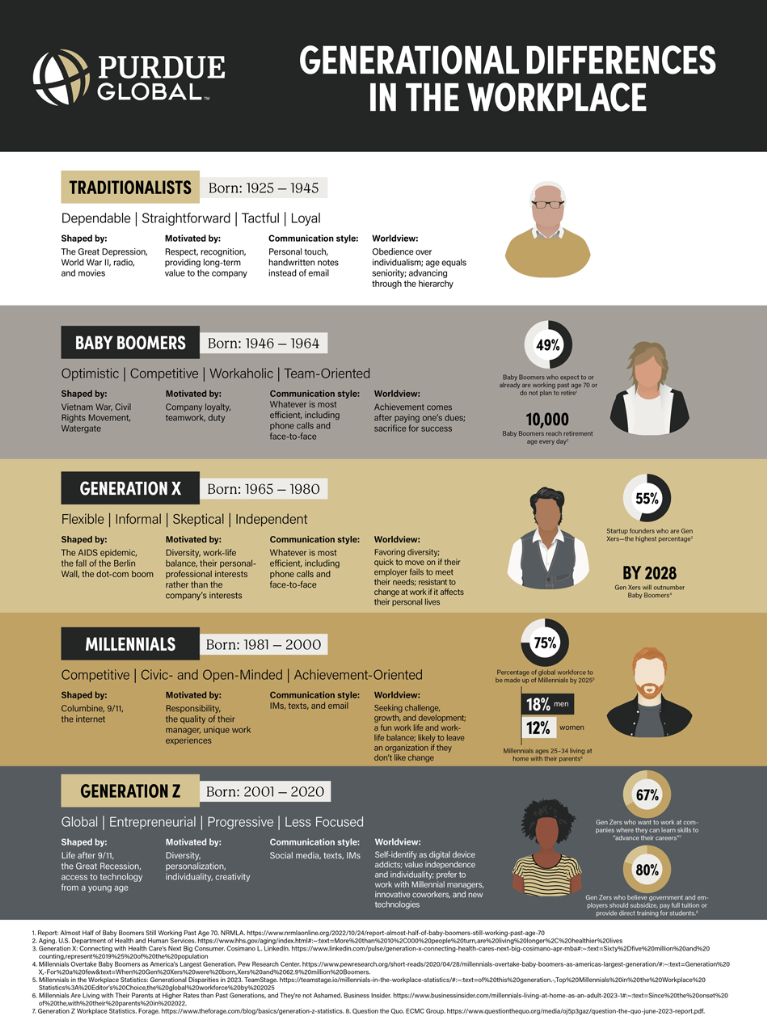Generational Differences in the Workplace
September 19, 2024
For the first time in history, there are five generations in the workplace. They are:
- Traditionalists—born 1925 to 1945
- Baby Boomers—born 1946 to 1964
- Generation X—born 1965 to 1980
- Millennials—born 1981 to 2000
- Generation Z—born 2001 to 2020
These may be just numbers in a continuum, but when you see the stats it's easy to recognize why companies are set for challenges every day:
- 10,000 Baby Boomers reach retirement age every day.
- 55% of startup founders are Gen Xers — the highest percentage.
- By 2028, Gen Xers will outnumber Baby Boomers.
- 67% of Gen Zers want to work at companies where they can learn skills to advance their careers.
- 80% of Gen Zers believe government and employers should subsidize, pay full tuition, or provide direct training for students.
So, what kinds of challenges does this present for today’s employers?
Let’s review Purdue Global’s infographic study to get a better view:

Baby Boomers
Born: 1946–1964
- Optimistic, competitive, workaholic, team-oriented.
- Shaped by: The Vietnam War, civil rights movement, WatergateMotivated by: Company loyalty, teamwork, duty.
- Communication style: Whatever is most efficient, including phone calls and face-to-face.
- Worldview: Achievement comes after paying one’s dues; sacrifice for success.
Generation X
Born: 1965–1980
- Flexible, informal, skeptical, independent
- Shaped by: The AIDs epidemic, the fall of the Berlin Wall, the dot-com boomMotivated by: Diversity, work-life balance, their personal-professional interests rather than the company's interests.
- Communication style: Whatever is most efficient, including phone calls and face-to-face.
- Worldview: Favoring diversity; quick to move on if their employer fails to meet their needs; resistant to change at work if it affects their personal lives
Millennials: Today’s Workforce Engine
Born: 1981–2000
- Competitive, civic- and open-minded, achievement-oriented.
- Shaped by: Columbine, 9/11, the internet.
- Motivated by: Responsibility, the quality of their manager, and unique work experiences.
- Communication style: IMs, texts, and email.
- Worldview: Seeking challenge, growth, and development; a fun work life and work-life balance; likely to leave an organization if they don't like change
Generation Z: They May Drive You Crazy, But They're Fueled by Innovation
Born: 2001–2020
- Global, entrepreneurial, progressive, less focused.
- Shaped by: Life after 9/11, the Great Recession, and access to technology from a young age.
- Motivated by: Diversity, personalization, individuality, creativity.
- Communication style: Social media, texts, IMs.
- Worldview: Self-identifying as digital device addicts; valuing independence and individuality; prefer to work with Millennial managers, innovative coworkers, and new technologies
Bridging Generational Divides
Demographic change is a critical but often overlooked issue affecting organizations.
The U.S. working-age population (ages 16 to 64) is shrinking at an unprecedented rate, with Generation Z being three million smaller than Millennials, and Generation Alpha expected to be even smaller.
Many businesses, driven by early retirements, ageism, and cost-cutting during the pandemic, let go of older workers, losing valuable expertise and loyalty. With fewer younger workers entering the labor market, employers that fail to plan for this demographic shift will face challenges in building a stable and efficient workforce in the future.
So What To Do? Look At Generations As Cultures.
Multigenerational teams often face interpersonal tensions due to differences in technology use, communication styles, and views on work and leadership. These tensions can lead to stereotyping and attempts to "fix" other generations.
However, leaders should view generational differences as strengths rather than problems. Just as cultural differences offer insight into people's backgrounds, generational differences can enrich teams without creating division.
Treating generations as distinct cultures can create inclusive environments that foster mutual respect and enable everyone to contribute their best. Cross-cultural skills can help bridge generational divides and promote effective collaboration.
Information via Agustin at vintti.com
%20(1).png)
